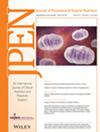Association between enteral nutrition initiation within 48 h of intubation and 90-day mortality in patients with severe acute heart failure requiring mechanical circulatory support: A retrospective cohort study
Abstract
Background
We explored the association between the initiation of enteral nutrition within 48 h of intubation and 90-day mortality in patients with severe acute heart failure requiring mechanical circulatory support.
Methods
We retrospectively analyzed patients with acute heart failure who were admitted to the critical care unit and underwent endotracheal intubation and mechanical circulatory support. Multivariate Cox proportional hazard models were used to evaluate the association between early enteral nutrition and 90-day mortality. Multivariate logistic regression analyses were used to evaluate the association between early enteral nutrition and the incidence of infectious- and enteral nutrition-related complications. The following variables were used in the analysis: sequential organ failure assessment, lactate, length of mechanical circulatory support, early enteral nutrition, body mass index, chronic renal failure, serum albumin level, cardiopulmonary arrest, diabetes mellitus, intraaortic balloon pump, venoarterial extracorporeal membrane oxygenation, and IMPELLA. These variables were then examined in models with different combinations for outcomes.
Results
The analysis included 80 and 35 patients in the early and delayed enteral nutrition groups, respectively. Multivariate analysis indicated that early enteral nutrition was an independent factor for reduced 90-day mortality (model 1: hazard ratio = 0.39 [95% confidence interval = 0.19–0.77]; model 2: hazard ratio = 0.38 [95% confidence interval = 0.19–0.76]; model 3: hazard ratio = 0.41 [95% confidence interval = 0.20–0.81]; and model 4: hazard ratio = 0.38 [95% confidence interval = 0.19–0.76]). Furthermore, early enteral nutrition was an independent factor for infectious complications but not for enteral nutrition-related complications.
Conclusion
Early enteral nutrition can be initiated without increasing complications in patients with severe acute heart failure requiring mechanical circulatory support. This may have beneficial effect on improving prognosis.



 求助内容:
求助内容: 应助结果提醒方式:
应助结果提醒方式:


